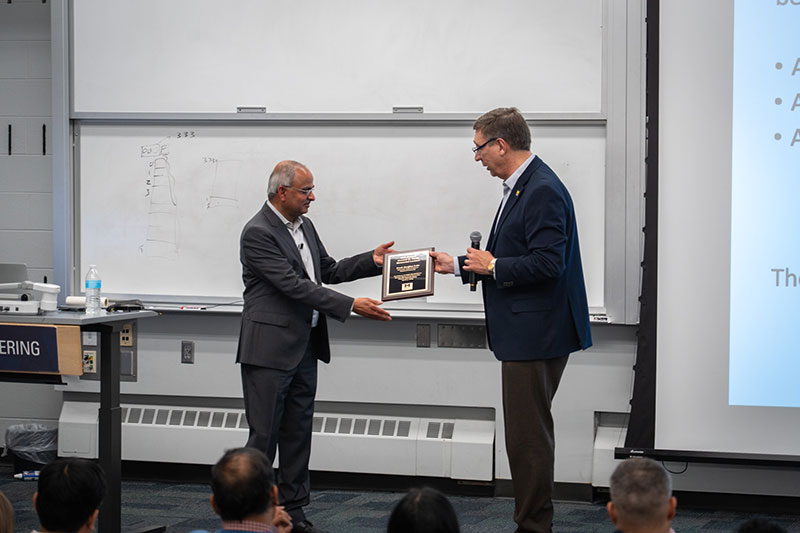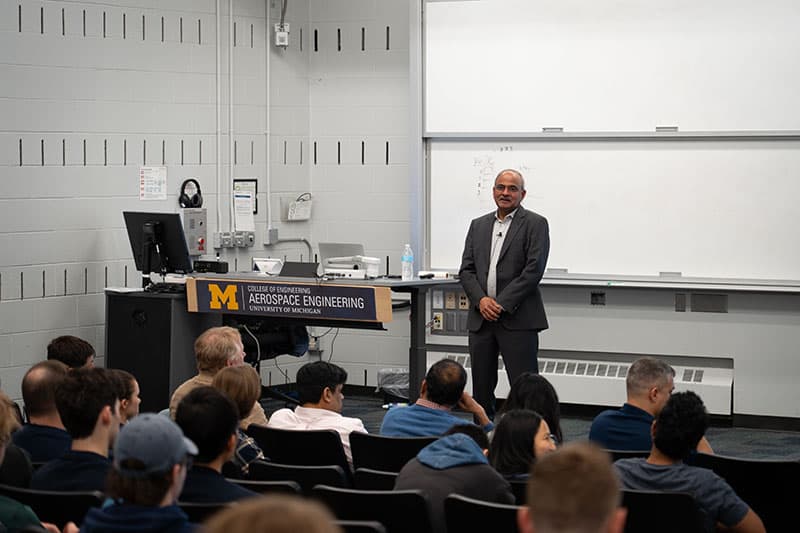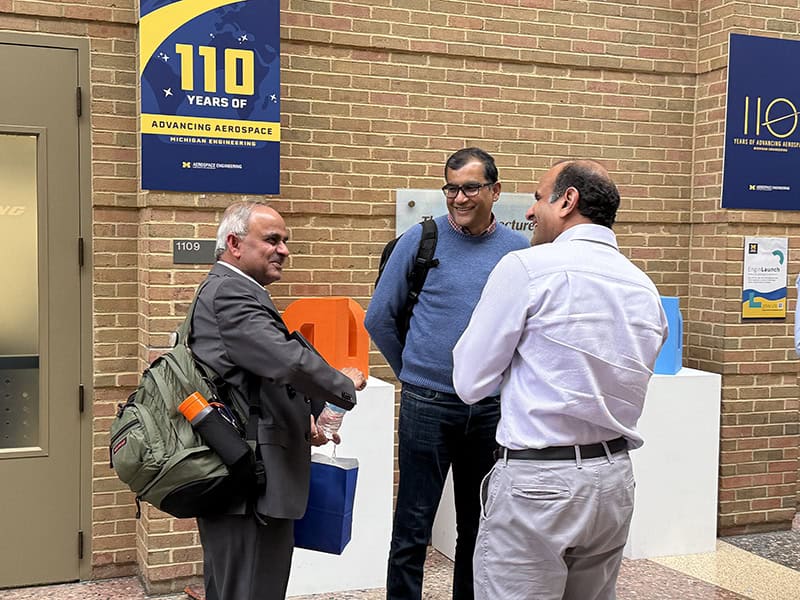
16th Annual Gerard M. Faeth Memorial Lecture
Welcoming Professor Sanjiva K. Lele from Stanford University, presenting “Turbulence in high-speed flows: recent advances in numerics, physics and modeling”

Welcoming Professor Sanjiva K. Lele from Stanford University, presenting “Turbulence in high-speed flows: recent advances in numerics, physics and modeling”
On April 3, 2025, our department proudly hosted the 16th annual Gerard “Jerry” M. Faeth Memorial Lecture with this year’s guest speaker and honoree, Professor Sanjiva K. Lele, the Edward C. Wells Professor of the School of Engineering and Professor of Mechanical Engineering at Stanford University.
“I am really honored by this invitation, and very highly respect the work that Jerry Faeth did over the years,” commented Professor Lele during his lecture.
Professor Lele received his Bachelor of Technology from IIT Kanpur, India, his PhD from Cornell University and Postdoctoral training at NASA-Stanford Center for Turbulence Research. Throughout his career, his research interests include diverse unsteady flow phenomena, flow instabilities, turbulence and aerodynamic noise with special interest in developing high-fidelity numerical methods for flow simulations.
Additionally, he has received various notable awards including the F. N. Frankiel Award from APS in 1986, the Presidential Young Investigator Award from NSF in 1991 along with the AIAA Aeroacoustics Award and the Distinguished Alumnus Award from IIT Kanpur, both in 2016. He is a Fellow of the American Physical Society and Associate Fellow of American Institute of Aeronautics and Astronautics (AIAA), served as an Associate Editor of the Journal of Fluid Mechanics from 1994 – 2004 and currently serves as Associate Editor for Physical Review Fluids.

During the lecture, Professor Lele presented on turbulence in high speed flows with recent advances in numerics, physics and modeling, highlighting breakthroughs in the field over the past five to ten years. He started by providing examples of problems that the aerospace engineering industry is facing in today’s environment in the context of turbulence and high speed flow that are derived from much broader implications. These examples included supersonic transportation, efficiency in transportation in the civilian sector, growth in the area of advanced air mobility, combustion problems involving aerothermodynamics associated with very high speed flight, and more.
With these examples, Professor Lele emphasised the importance of multi physics predictive simulations, stating that as a community this area of research is required when considering elements of aerodynamics, aeroacoustics, propulsion and so on. In the context of multiphysics turbulent flows, Professor Lele highlighted enabling advances in numerical algorithms and illustrated examples of how computational experiments help improve our understanding of turbulence physics in high-speed flows and aeroacoustics, and opportunities for improving engineering modeling using turbulence resolving data.
Throughout his lecture, Professor Lele focused on three main topics of his expansive research, including different aspects of physics in relation to numerics for turbulent flows and compressible turbulence, jet acoustics, and transonic buffet while also highlighting system level modeling related to all unsteady motions. From there he presented numerous examples of work he and his colleagues and students have published explaining the simulations, calculations and in-depth research behind this area of study.

Professor Lele then concluded his presentation with questions from attendees and Professor Cesnik presenting Professor Lele with an honorary plaque in recognition of his joining us for the honorary lecture.
About Gerard M. Faeth:
Jerry Faeth, a renowned researcher for his work in the aerospace industry, received his bachelor’s degree in mechanical engineering at Union College in New York in 1958. He went on to complete his Master’s and PhD in mechanical engineering and later accepted a joint appointment with the Department of Mechanical Engineering and the Applied Research Laboratory at Pennsylvania State University.
In 1985, Faeth joined the University of Michigan as an associate research scientist and soon became the Arthur B. Modine Professor of Aerospace Engineering and the Head of the Gas Dynamics Laboratories. Although he focused primarily on mechanical engineering, Faeth continuously expanded his knowledge in various fields across combustion science, heat transfer, propulsion systems and fluid dynamics.
Throughout his career, he was awarded numerous honorary acknowledgments in research, academia and from various government organizations and professional societies where he was either a member or chair. With over 500 publications, focusing notably on laminar flames and soot processes, his research led to his becoming a Fellow of the American Institute of Aeronautics and Astronautics (AIAA), winning the Heat Transfer Memorial Award from the American Society of Mechanical Engineering (ASME) and being awarded the Excellence in Research Award from the U-M College of Engineering.
Additionally, he also was the recipient of the Stephen Atwood Award, the highest research award you can receive at the College of Engineering at U-M, and was awarded a Distinguished University Professorship for his excellence in teaching and research, the highest honor a faculty member can receive at the University of Michigan. That same year, the Combustion Institute awarded him the Alfred C. Edigerton Gold Medal for his distinguished and continuing contributions to the field of combustion.
After his passing in 2005, the Department of Aerospace Engineering at U-M established the Gerard Faeth Memorial Fund to remember him and his many contributions to the industry and now sponsors this annual memorial lecture in his honor.